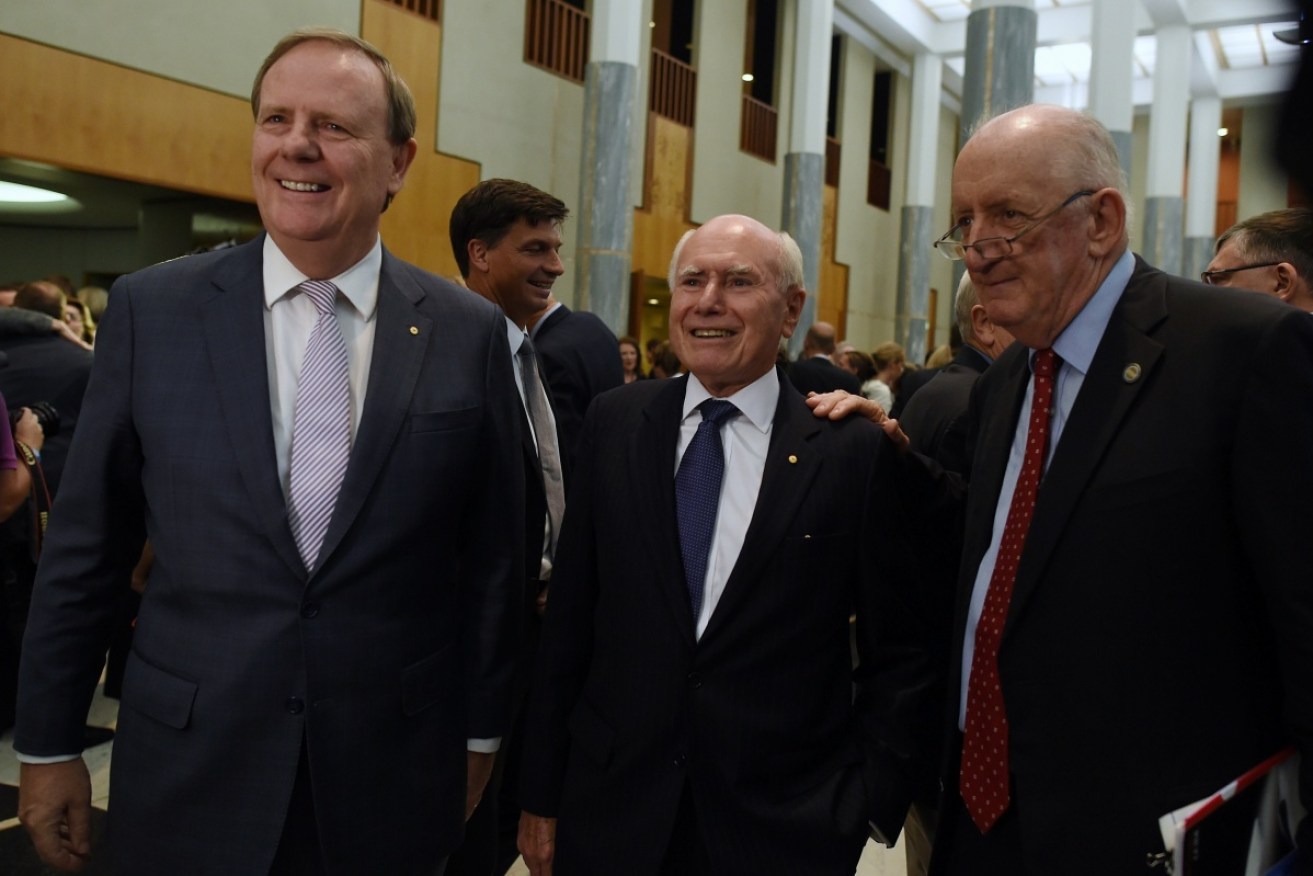Scott Morrison has plenty to learn from Peter Costello when it comes to badgering the banks

Scott Morisson could learn from Peter Costello's forceful style when dealing with the banks. Photo: AAP
ANALYSIS
When it comes to dealing with the banks Treasurer Scott Morrison should take advice from one of his predecessors – Peter Costello.
On 3 October 2001, the Reserve Bank lowered official rates by 0.25 per cent to help counter a potential slowdown in the Australian economy.
The cut was taken to stimulate economic activity by providing rate relief for households and business borrowers.
The then-treasurer Costello seized on the announcement by ringing each of the major banks to demand they pass on the full benefit of the RBA cut to borrowers.
Mr Costello also requested that each of the banks send him an advance copy of their media releases announcing their pricing responses to the RBA decision.
“My office rang each of the banks and asked the banks when they would be passing on this rate cut,” he told ABC radio the day after the RBA’s 2001 rate cut.
“Now, that is because when rates are cut, it is not for the benefit of the banks – it is done for the benefit of borrowers.”

Mr Costello sometimes bullied the banks. Photo: AAP
As Treasurer for 11 years in the Howard government, Mr Costello was proactive in dealing with the banks and sometimes bullied them – with the threat of public humiliation – into passing on rate relief to borrowers.
But Mr Costello’s harassment of the banks went way beyond interest rates. He also hectored them on fee hikes and regularly referred cases of misleading marketing to consumer regulators for investigation.
Mr Costello’s uncompromising methods for dealing with the banks were grounded in a recognition that bankers really were “bastards”.
Unlike Scott Morrison and his predecessor Joe Hockey, Mr Costello rarely waited in hope for the banks to do the right thing.
‘Light touch’ is ineffective
Mr Morrison’s approach is something of a contrast to Mr Costello’s persistent efforts to jawbone the banks into serving the national economic interest and meeting community expectations.
In almost a year at the reins of the treasury portfolio, Mr Morrison has been half-hearted about calling out the banks on just about anything.

Mr Morrison has been half-hearted about calling out the banks. Photo: AAP
That is despite plenty of academic and market research showing that the major banks have managed to fatten their lending margins on credit cards, personal loans and business credit since the RBA started reducing official rates five years ago.
The Turnbull government seems to operate in some kind of a time warp where it expects the Australian public to reserve judgement on the merits of the banks’ pricing decisions and market conduct.
The big problem for the government is that Australian credit cardholders would like to know why they are paying more interest today for revolving debt compared to five years ago when funding was more expensive for the banks.
The government’s limp-wristed attitude to the banks overlooks how Australian consumers and businesses have been snookered for a decade into underwriting the record profits of the big four banks.
Treasurer should agitate for broader economy, not banks
Instead of trying to embarrass or cajole the banks into delivering the full benefit of the RBA’s 2 August rate cut, Mr Morrison’s immediate reaction was to say the decisions rested with the banks.
“Of course we would like to see them pass all of these things on, but what we’ve seen from at least the two that have made a decision is not the traditional response,” he said.
“It’s not like they didn’t pass it all on and did nothing else. What they’ve done is they’ve cut their mortgage rates and they’ve increased their deposit rates.”
Mr Morrison’s comments can almost be construed as an attempt to shore up a defence for the banks passing only part of the official rate cut to borrowers.

Instead of cajoling the banks into delivering the full RBA rate cut, Mr Morrison said the decisions rested with the banks. Photo: AAP
Mr Costello’s record suggests he would have taken a more combative attitude towards the banks, with the clear aim of diverting the benefits of the RBA’s monetary stimulus from bank shareholders to people in the broader economy.
Mr Morrison’s comments also overlook the fact that the Australian Prudential Regulation Authority has been piling pressure on the major banks to increase the level of retail deposits held in their vaults.
The banks’ respective decisions to increase term deposit rates this month have nothing to do with the RBA cut and the Treasurer should have known that.
Instead, he tried to make out that the banks were somehow splitting the benefits of the official rate cut between borrowers and savers.
Banks set to exploit cheaper funding costs
Despite persistent rhetoric spewing from the banks that they are under pressure from rising funding costs, recent movements in wholesale markets suggest the opposite is happening.
ANZ last week raised $2.5 billion (repayable in five years) in the domestic bond market at a cost of approximately 1.13 per cent above the bank bill swap rate.
This is the lowest price that an Australian bank has paid for raising cash through the local bond market since December last year. For a full explanation, see here.

Despite the rhetoric, the banks are set to exploit cheaper funds. Photo AAP
Westpac did even better overseas earlier this month, paying only 0.85 per cent over the London swap rate for $2 billion that is repayable in five years.
The cheaper funding is good news for each of these banks’ interest margins and should help to strengthen their profitability in the medium term.
If wholesale funding costs continue to fall each of the major banks could be positioned to generate even more impressive profits over the next two years.
Instead of waiting for bank executives to tell a parliamentary committee why they won’t pass on the benefits of this extra reduction to their funding costs, Mr Morrison should be trumpeting the case for why they should.








